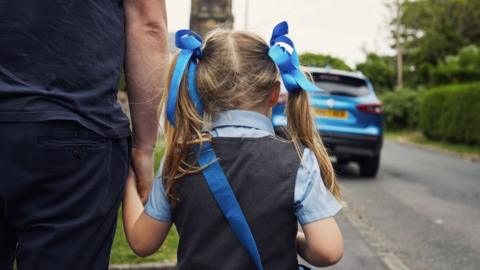Natalie Perera, from the EPI, said it is the first time "a very clear link" has been made between how much children from the lowest income families attend school, and how far behind other pupils they have fallen.
Her team looked specifically at children who have received free school meals in the past six years, which means the family income is less than £7,400 a year after tax and not including benefits.
Ms Perera said more research was needed to understand why these children struggled to be in school, with possible factors including poor housing and mental health.
It is five years since the UK went into lockdown, when schools closed to most children.
Playgroups and nurseries also shut, with parents of babies and toddlers isolated from their extended family. There were other changes too, as health visitors were re-deployed or in contact with parents only online.
